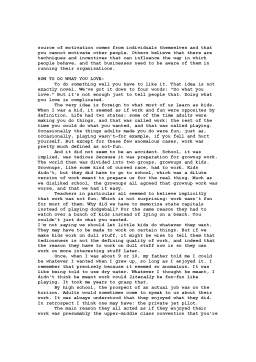Extras din referat
Why do people work?
Work is a big part of people’s lives.
Work’ is a hard word to define. One person’s idea of work can be another person’s idea of leisure. Something that you dislike doing at work, you might quite enjoy in a leisure setting.
Most dictionary definitions of the word ‘work’ say that work activity is directed at a specific purpose, and involves mental or physical effort.
Is work still work if you don’t get paid for it? People work productively in all areas of life without being paid; unpaid work is estimated to be equal to approximately half of Australia’s total gross domestic product (GDP). This unpaid work includes:
- housework in households, child care and shopping for the home
- volunteer and community work
- work done free of charge (favours for others).
Why work? When you ask people why they work, a lot of them will say they’re ‘only in it for the money’. When you work for money, you can be financially independent, and have some control over your life.
Sometimes money truly is the only reason a person works. But most people have more substantial reasons for working. For example:
- They like to spend their days doing something they’re good at.
- They like being productive.
- Other people need their skills, and they feel obliged to supply them
What if you didn’t work and you had every day to yourself? You could choose to go to the beach, watch television, go to the movies, go shopping, read books, visit friends, visit places of interest, go out for meals, play sport…
This all sounds wonderful, but you’d need at least some money to do most of these things. Relaxing and doing what you please is great for a holiday, but after a while the pleasure can wear off and you can feel aimless and bored.
People get job satisfaction when their work:
- pays them enough to fulfil their most important needs
- pays them fairly for the work they do
- looks after them, providing a protective environment and ensuring their safety as they work.
- gives them a social life—they belong to a team and interact regularly with different people
- makes them feel good about themselves—they can see themselves gaining experience, expertise, status and acknowledgement by their colleagues and superiors
- fulfils them—it gives them a sense of personal achievement by presenting them with new challenges, helping them grow and be creative
Why do people work?
The answer is simple: work provides us with the means to
earn money, which in turn allows us to acquire what we need in our daily lives.
However, work is more complex than this. We do not work just to earn money: there are many other reasons for having a job. This is highlighted by women who, after having children, want to return to work. They may need to work to increase the family income, but they may also wish to work in order to satisfy other needs, such as challenge, social relationships and a feeling of self-worth. Men are no different in this respect.
Business organisations need people to carry out activities for the business. They therefore hire workers with different skills, aptitudes and qualifications to do this work. Thus, business relies on groups of people who specialise in particular things.
This process of specialisation has developed over many years as productive tasks have been broken down into stages with specialists employed at each stage. This is called division of labour. We see examples of the division of labour in every aspect of our lives. People are specialists in particular areas of work — some may be nurses and could specialise in one aspect of nursing; others may be management accountants, some may work in factories doing skilled work, others as bricklayers, some as receptionists and so on.
In hiring the services of people to contribute to production, businesses must pay a price — a wage or salary to workers in return for their efforts. The success of any business is largely down to the people who work in it, so ensuring that employees are motivated is important for any firm.
Preview document
Conținut arhivă zip
- Why do People Work.doc












